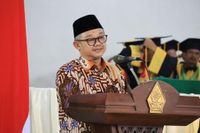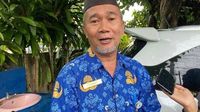The Indonesian Ministry of Basic and Secondary Education (Kemendikdasmen) is set to reinstate the major system in high schools, a move that will bring back dedicated tracks for Science, Social Sciences, and Languages. This announcement was made by the Minister of Basic and Secondary Education, Abdul Mu’ti, during a Halalbihalal event with the Education Journalists Forum (Fortadikbud) at the Kemendikdasmen Library in Jakarta on April 11, 2025.
Mu’ti emphasized that the revival of these majors aligns with the government’s initiative to reduce the content of subjects from elementary to high school, which is part of a broader strategy to implement a deep learning approach that prioritizes meaningful education. “We will activate the majors again—Science, Social Sciences, and Languages. In the Academic Ability Test (TKA), there will be mandatory subjects of Indonesian and Mathematics,” Mu’ti stated.
Under the new system, students majoring in Science will have the option to choose from subjects such as Physics, Chemistry, or Biology, while those in Social Sciences can select subjects like Accounting. This change is particularly significant as the TKA will be implemented for 12th-grade students starting in November 2025, and the results can be utilized for university admissions without requiring additional entrance exams.
Although participation in the TKA is optional, Mu’ti noted that students who take the test will have an academic advantage, as their scores can serve as a foundation for their university applications. He explained, “There are students in the Social Sciences track who get accepted into Medical Faculty but struggle in their studies because their foundational knowledge doesn’t align.”
In addition to reinstating majors, Kemendikdasmen plans to simplify the subject matter taught from elementary through high school. This is not about reducing the number of subjects but rather about refining the content to enhance depth of understanding. “Starting in the 2025/2026 academic year, several changes will be implemented. The subject matter will be simplified so students can learn more deeply and contextually. The learning process will focus on critical thinking, problem-solving, and meaningful learning,” Mu’ti explained.
While the content will be trimmed, there will also be an introduction of new subjects such as coding and artificial intelligence (AI) as optional electives. Mu’ti anticipates that schools will embrace these changes enthusiastically, as they reflect the evolving educational landscape.
The TKA, as part of the new system, will be subject-based and aims to assist students in their transition to higher education. “The TKA will be based on subjects to help parties, especially students, who are continuing to higher education. Because the test is subject-based, we will revive the majors again. So, there will be Science, Social Sciences, and Languages,” Mu’ti reiterated during a later address on the same day.
He further clarified that in the TKA, mandatory subjects will include both Indonesian Language and Mathematics, along with specific subjects for each major. For instance, students majoring in Science can choose to take additional tests in Physics, Chemistry, or Biology, while those in Social Sciences can opt for tests in Economics, History, and other related subjects.
Mu’ti expressed hope that the TKA, combined with the reintroduction of majors in high school, would provide a clearer picture of students’ abilities and their compatibility with chosen university programs. “In this way, a person’s academic ability will serve as a foundation when they want to continue to a specific major in higher education. So, it can be seen from their academic capability scores,” he said.
Moreover, the TKA is designed to be a valid and standardized individual test that universities can use to evaluate prospective students. This approach not only aims to streamline the admission process but also to ensure that students are adequately prepared for their chosen fields of study.
As Indonesia’s educational framework evolves, these changes reflect a commitment to enhancing the quality of education and ensuring that students are better equipped for future challenges. The focus on meaningful learning, critical thinking, and the introduction of modern subjects like coding and AI indicates a shift towards a more relevant and effective educational system.
In conclusion, the reinstatement of the major system and the introduction of the TKA mark a significant step forward in Indonesian education, aiming to better align students' learning experiences with their future academic and career aspirations. As the 2025/2026 academic year approaches, schools and students alike are preparing for these transformative changes, which promise to reshape the educational landscape in Indonesia.






